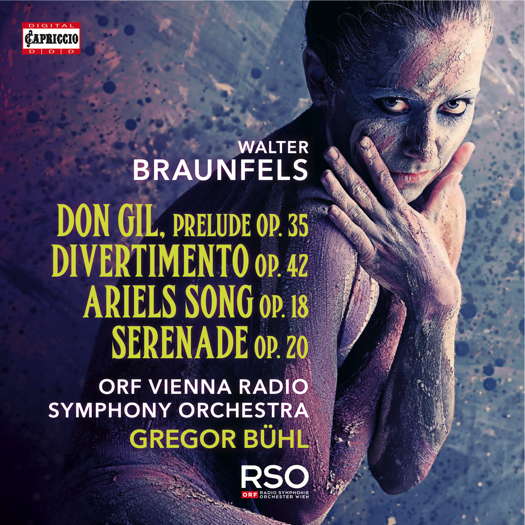- waltz music
- Sándor Szokolay
- Ivan Fedorovych Karabyts
- Béla Bartók
- Harry van Hoof
- Charles Koechlin
- Atli Heimir Sveinsson
- Johann Caspar Ferdinand Fischer
 DISCUSSION: What is a work? John Dante Prevedini leads a discussion about The performing artist as co-creator, including contributions from Halida Dinova, Yekaterina Lebedeva, Béla Hartmann, David Arditti and Stephen Francis Vasta.
DISCUSSION: What is a work? John Dante Prevedini leads a discussion about The performing artist as co-creator, including contributions from Halida Dinova, Yekaterina Lebedeva, Béla Hartmann, David Arditti and Stephen Francis Vasta.
 SPONSORED: CD Spotlight. Well Realized - Varda Kotler and Israel Kastoriano - recommended by Geoff Pearce.
SPONSORED: CD Spotlight. Well Realized - Varda Kotler and Israel Kastoriano - recommended by Geoff Pearce.
All sponsored features >>

A Unique Orchestral Mastery
Music by Walter Braunfels, heard by GERALD FENECH
'Gregor Bühl ... marshalls his forces with full-blooded conviction, and his orchestra responds brilliantly to Braunfels' luscious musical language ...'
Walter Braunfels (1882-1954), one of Germany's late romantics, was born in Frankfurt into a strong musical family. His first teacher was his mother, the great-niece of the composer Louis Spohr. When still young, he continued his piano studies at the Hoch Conservatory in his city of birth, but later he turned his attention to law and economics at Munich University, until after a performance of Wagner's Tristan und Isolde he decided to devote his life totally to music. After furthering his piano and compositional studies in Vienna and Munich respectively, in February 1918 he found himself on the front during the First World War, where he was wounded. Surviving this harrowing experience, he converted from Protestantism to Catholicism in June of that same year, and this spiritual transformation spurred him to compose his Te Deum (1920-21) as an expression of his new-found faith.
He achieved early success with the melodious opera Die Vögel (The Birds, 1920), so much so that Hitler, not realizing that Braunfels was half-Jewish, in 1923 invited the composer to write an anthem for the Nazi Party. Obviously, Braunfels flatly refused. Up to the late 1940s, Braunfels performed as a professional pianist for most of these years, and he was also invited by Konrad Adenauer, then mayor of Cologne, to serve as first director of the Cologne Academy of Music from 1925 to 1933, and again, from 1945 to 1950. With the rise of the Nazis to power he was dismissed, and being of Jewish descent, his music, like that of many others, was labelled 'degenerate' and banned from the concert halls.
He retired from public life but continued to compose, and when the war ended, Braunfels returned to public life and the world of music. Between the two wars Braunfels had earned himself a reputation as an excellent composer, especially in the operatic and symphonic genres, but after his death in March 1954 his music fell into oblivion. After a long wait, there is now something of a renaissance of interest in his works. And why not indeed? Braunfels' music is in the German classical-romantic tradition where the orchestral technique is recognizably that of the German school with luscious writing for violins and horns, occasional outbursts of extreme virtuosity all round and a discerning but minimal use of additional percussion.
The works on this CD are all prime examples of Braunfels' gift for melody and structure, and each piece has its own distinctive features that make it so attractive to listen to. The short prelude to the comic opera Don Gil of the Green Breaches (1921-23) gives us a hint about Don Gil's character, which from its sound-world, can be safely compared to Till's spirit in the famous Richard Strauss tone-poem. Braunfels wanted to write a light opera buffa, but instead the work turned into a mix of jollity and seriousness, and the Suite the composer arranged portrays this ambivalence with a unique orchestral mastery.
Listen — Walter Braunfels: Vorspiel (Don Gil von den grünen Hosen)
(track 1, 0:00-0:59) ℗ 2021 Capriccio :
In the Divertimento, Op 42 (1929), composed for radio, Braunfels reveals a side of his compositional style not hitherto seen. Jazz had reached even him, and the two saxophones that share the opening statement of this twenty-minute piece are pivotal in giving this work a truly contemporary flavour.
Listen — Walter Braunfels: Mäßig bewegt (Divertimento, Op 42)
(track 2, 0:01-1:00) ℗ 2021 Capriccio :
The other two compositions on this recording both date from 1910. The Serenade, Op 20, is an innocently romantic inventive suite of four movements in slow-fast-slow-fast order, full of genuine intensity of feeling and lighthearted gaiety, not unlike Schubert's lighter melodies.
Listen — Walter Braunfels: Ruhig (Serenade Op 20)
(track 10, 0:00-0:57) ℗ 2021 Capriccio :
Ariel's Song, Op 18, is another work scored for small orchestra after Shakespeare's The Tempest, which is moulded in the same happy vein.
Listen — Walter Braunfels: Ariels Gesang Op 18
(track 7, 7:33-8:29) ℗ 2021 Capriccio :
Gregor Bühl's advocacy for Braunfels' music goes on unabated, and this latest helping is undoubtedly another wonderful issue in this ongoing cycle. Indeed, Bühl marshalls his forces with full-blooded conviction, and his orchestra responds brilliantly to Braunfels' luscious musical language with crisp, wholly articulated performances that betray the intricate yet discernible structure of these scores. Excellent sound and annotations complete another invaluable addition to the steadily growing Braunfels discography.
Copyright © 15 May 2021
Gerald Fenech,
Gzira, Malta

CD INFO: WALTER BRAUNFELS - ORF VIENNA SYMPHONY ORCHESTRA


